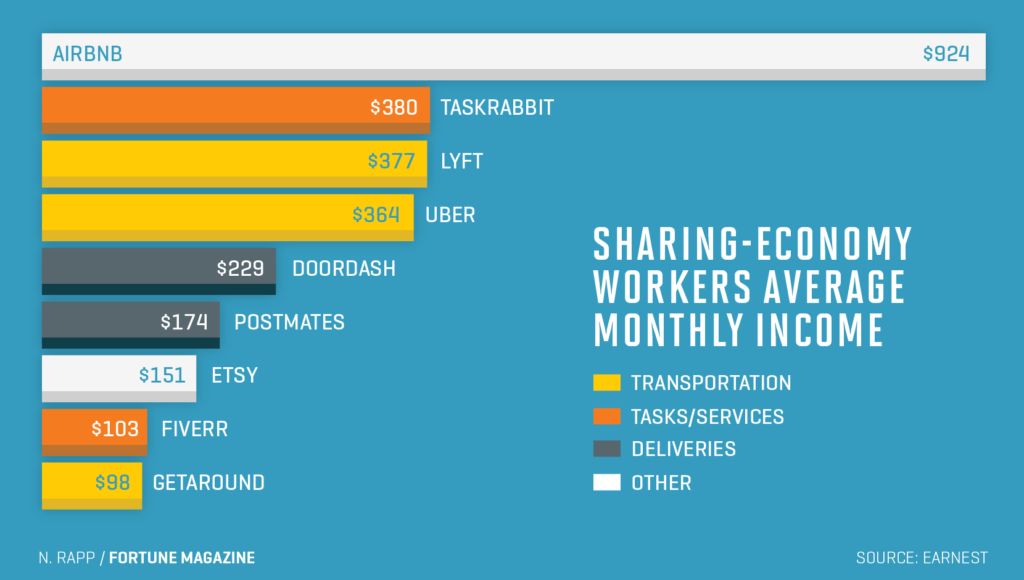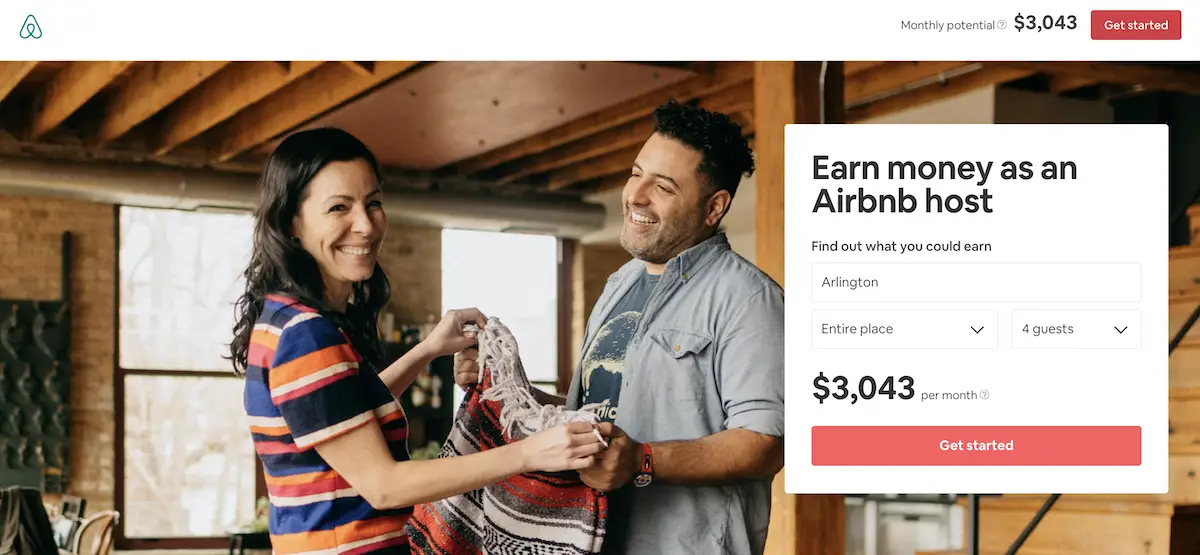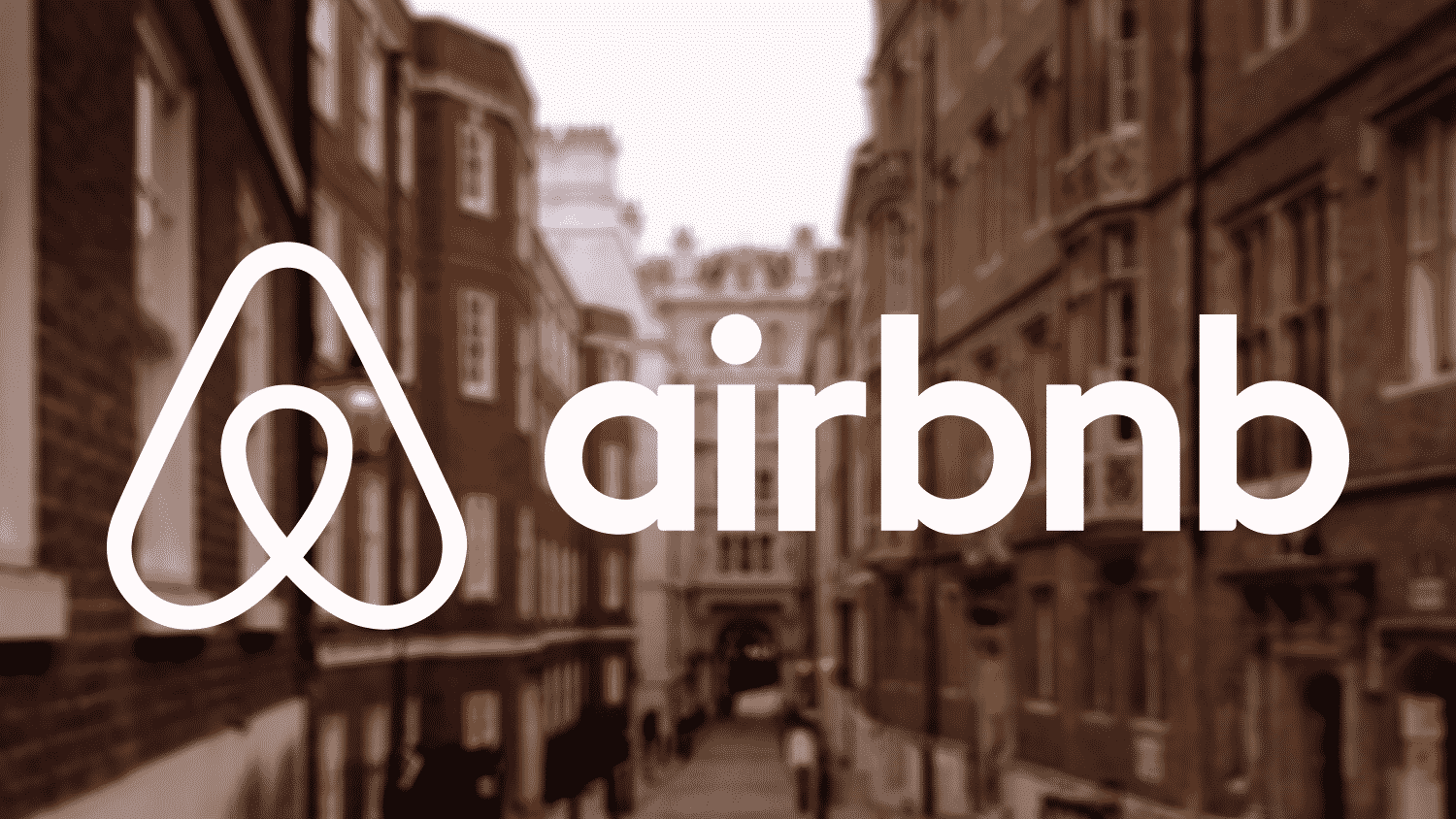I think we can all appreciate a good side gig — a flexible work schedule, side income, and working on your own terms.
It’s no secret that the gig economy is growing from this digital platform economy.
In fact, 36% of U.S. workers participate in the gig economy through either their primary or using secondary gig economy jobs.
Want to get your feet wet in this pool of gig workers?
Why not start earning with the highest paying gig economy job, Airbnb, according to a report from Earnest.

What is Airbnb?
Airbnb began in 2008 when two designers who had space to share hosted three travelers looking for a place to stay.
Now, millions of hosts and travelers choose to create a free Airbnb account so they can list their space and book unique accommodations anywhere in the world. In fact, Airbnb had 4 million hosts at the end of 2020.
And Airbnb experience hosts share their passions and interests with both travelers and locals.
Who Can be an Airbnb Host?
It’s easy to become an Airbnb host in most areas, and it’s always free to create a listing.
Entire apartments and homes, private rooms, treehouses, and castles are just a few of the properties hosts have shared on Airbnb.
For more details on what’s expected of hosts, check out Airbnb’s community standards, which revolve around safety, security, and reliability, and hospitality standards, which help hosts earn great guest reviews.
What is Required of Guests Before Booking?
Everyone who uses Airbnb must provide a few pieces of information before they can book a room from you.
Guests need to have this info completely filled out before they can make a reservation request.
This info helps make sure you know who to expect, and how to contact the guest.
Airbnb’s requirements for guests include:
- Full name
- Email address
- Confirmed phone number
- Introductory message
- Agreement to your House Rules
- Payment information
Guests are expected, but not required, to have a profile picture. You may also require guests to provide ID before booking your space.
How Much Does it Cost to List My Space?
Signing up for Airbnb and listing your home is completely free.
Once you receive a reservation, you will be charged an Airbnb service fee for hosts, generally 3%, to help cover the cost of running of the business.
How Can I List My Home on Airbnb?
To get started earning money as an Airbnb host you can sign up and list your space for free by visiting this page.

How Should I Choose my Listing’s Price?
The price you charge for your listing is completely up to you. To help you decide, you can search for comparable listings in your city or neighborhood to get an idea of market prices.
Additional Fees
Cleaning fee: You can either incorporate a cleaning fee into your nightly price or you can add a cleaning fee in your pricing settings.
Other fees: To charge extra fees outside of your rates (like a late check-in or pet fee), you must first disclose these potential charges to guests prior to booking and then use the Resolution Center to securely request payment for additional fees.
How Can Airbnb Help Me With Setting Prices?
Airbnb’s Smart Pricing tool lets you set your prices to automatically go up or down based on changes in demand for listings like yours.
You’re always responsible for your price, so Smart Pricing is controlled by other pricing settings you choose, and you can adjust nightly prices any time.
Smart Pricing is based on the type and location of your listing, the season, demand, and other factors (like events in your area).
How Can I Improve My Listing?
There are many reasons why people chose to host – some want to earn extra money while others simply want to meet new people. Before you begin your listing, take a look at these three tips to ensure that your Airbnb listing stands out from the rest!
Understand the Competition
Spend some time viewing some of the other listings in your area, what they are offering, their prices, and other amenities they are offering. Knowing what you are up against, can help give you some ideas to include in your listing.
Include Quality Photos
Guests spend more time looking at photos than any other part of a listing, so make sure you put your best foot forward!
Create a Great Host Profile
Your profile is a great way for others to get to know a bit more about you. Don’t forget to add a picture!
Write an Accurate Description of Your Space
Describe the uniqueness, style, and condition so that guests can imagine themselves enjoying your place
How Much Money Can I Make With Airbnb?
According to a recent report from SmartAsset:
- $20,619. That’s the average expected annual profit of Airbnb hosts renting out a full two-bedroom apartment or house in the 15 cities SmartAsset examined.
- 81% of your rent. On average, that’s what you could expect to pay by listing one room in a two-bedroom home on Airbnb.
- Miami and San Diego are the most profitable cities for Airbnb hosts.
Things to Consider Before Hosting
Some states, cities, and towns prohibit or regulate home rentals, either directly through their municipal code or through zoning rules.
Ensure you have the ability to rent out a room in your home and apartment. Check local laws and ensure that you are able to share your space and comply with all laws.
Understanding Risks and Liabilities
Airbnb Host Protection Insurance provides primary coverage for Airbnb hosts and landlords (when landlords are named in a lawsuit), worldwide. The program protects against liability claims brought by third parties — up to $1 million USD—that arise from a listing during a stay.
In the rare event that something doesn’t go as planned and someone files a lawsuit or claim against a host for bodily injury or property damage, hosts have access to Host Protection Insurance.
What’s covered?
Host Protection Insurance program provides primary liability coverage of up to $1 million USD per occurrence, in the event of third-party claims of bodily injury or property damage.
The program covers certain property damage in common areas of a property outside of the listing itself (for example: a building lobby). Landlords and homeowner associations are also covered in certain cases when claims are filed against them due to a guest suffering an injury during a stay or if a guest damages building property. Certain conditions, limitations, and exclusions may apply.
What’s not covered?
Host Protection Insurance program is limited to certain types of liability. Examples of what’s not covered include, but are not limited to:
- Property damage due to things like pollution or mold
- Damage or injury from something done intentionally (not an accident)
- Loss of earnings
For more information about what our Host Protection Insurance covers and doesn’t cover, visit the Help Center. You can also download a comprehensive program summary.
What Protections Do I Have Against Property Damage?
The Airbnb Host Guarantee provides protection for up to $1,000,000 to a host for damages to covered property in the rare event of guest damages above the security deposit or if no security deposit is in place.
The Host Guarantee program doesn’t cover cash and securities, collectibles, rare artwork, jewelry, pets or personal liability. They recommend that hosts secure or remove valuables when renting their place. The program also doesn’t cover loss or damage to property due to wear and tear.
Learn more about the Host Guarantee at http://airbnb.com/guarantee
Have you enjoyed our detailed Airbnb hosting guide? Let us know if you have any questions in the comments section below.


As I host, I have encountered some problems for guests, but as long as Airbnb policy is followed, I have been supported. It’s important to not get mad and use the system as intended; hosts and guests should be honest in their ratings to ensure the system works. Bad guests and bad listings get removed.